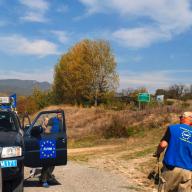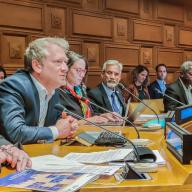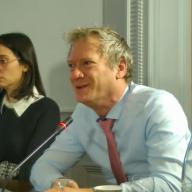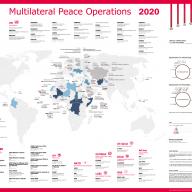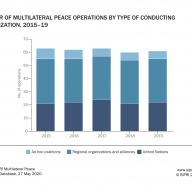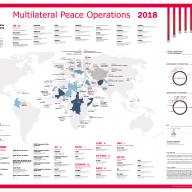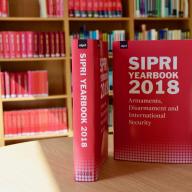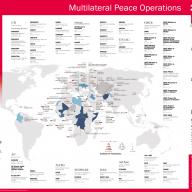As the 24th anniversary of United Nations Security Council Resolution 1325 on women, peace and security (WPS) approaches, SIPRI is pleased to share its recent work on the WPS agenda.
Related news: Data and trends for multilateral peace operations
SIPRI launches new EU Civilian CSDP Compact report in Brussels
On 15 November, SIPRI held a launch event for the new SIPRI Research Policy Paper ‘Delivering the Compact: Towards a More Capable and Gender-balanced EU Civilian CSDP’.
New video series: Towards a new civilian CSDP Compact
SIPRI is pleased to launch a new video series on perceptions of civilian crisis management and the efforts to strengthen the civilian Common Security and Defence Policy (CSDP) missions of the European Union (EU). The series features interviews with officials from EU member states and experts from the European Centre of Excellence for Civilian Crisis Management and other relevant European organizations.
SIPRI co-hosts event on improving the effectiveness of UN peace operations against climate-related impacts
As part of the 'Climate-related Peace and Security Risks' project, SIPRI co-hosted an expert round table on maintaining the operational resilience of peacekeeping operations in the face of climate-related disruptions. The event was held on 10 May in New York.
SIPRI co-convenes dialogue meetings in Geneva on peace operations and non-traditional security challenges
On 22–25 November, SIPRI and the Friedrich-Ebert-Stiftung (FES) held two dialogue events as part of a series that seeks to enhance understanding of United Nations and non-UN multilateral peace operations and non-traditional security challenges.
SIPRI co-hosts webinar on the impact of Covid-19 on peace operations
On 6 October, a webinar co-hosted by SIPRI and the United Nations Department of Peace Operations (UNDPO) explored the many impacts of Covid-19 on peace operations.
SIPRI releases new map of multilateral peace operations
SIPRI is pleased to release a new map showing all multilateral peace operations active as of May 2020.
Declining trends in multilateral peace operations continued in 2019; attention shifting towards the Middle East and North Africa–new SIPRI data
While the number of United Nations and non-UN multilateral peace operations increased slightly in 2019, the number of personnel deployed in them decreased, according to new data from the Stockholm International Peace Research Institute (SIPRI).
SIPRI releases map of multilateral peace operations in 2018
SIPRI is pleased to release a new map showing all multilateral peace operations active as of May 2018.
Modernization of nuclear weapons continues; number of peacekeepers declines: New SIPRI Yearbook out now
SIPRI today launches the findings of SIPRI Yearbook 2018, which assesses the current state of armaments, disarmament and international security.
UN peace operations have not become more dangerous, suggests new SIPRI report ahead of peacekeeping summit
A new report by the Stockholm International Peace Research Institute (SIPRI) on fatality trends in United Nations peace operations reveals that the rate of peacekeepers dying while in the service of the UN has steadily fallen over the past 25 years. The report, released to coincide with the summit on UN peacekeeping in New York, hosted later today by US President Barack Obama, provides a timely counterpoint to the popular perception that UN peace operations have become increasingly dangerous.
Nuclear force reductions and modernizations continue; peace operations increase—new SIPRI Yearbook out now
Stockholm International Peace Research Institute (SIPRI) today launches the findings of SIPRI Yearbook 2015, which assesses the current state of armaments, disarmament and international security. Key findings include: (1) all the nuclear weapon-possessing states are working to develop new nuclear weapon systems and/or upgrade their existing ones; and (2) the number of personnel deployed with peace operations worldwide continues to fall while the number of peace operations increases.



